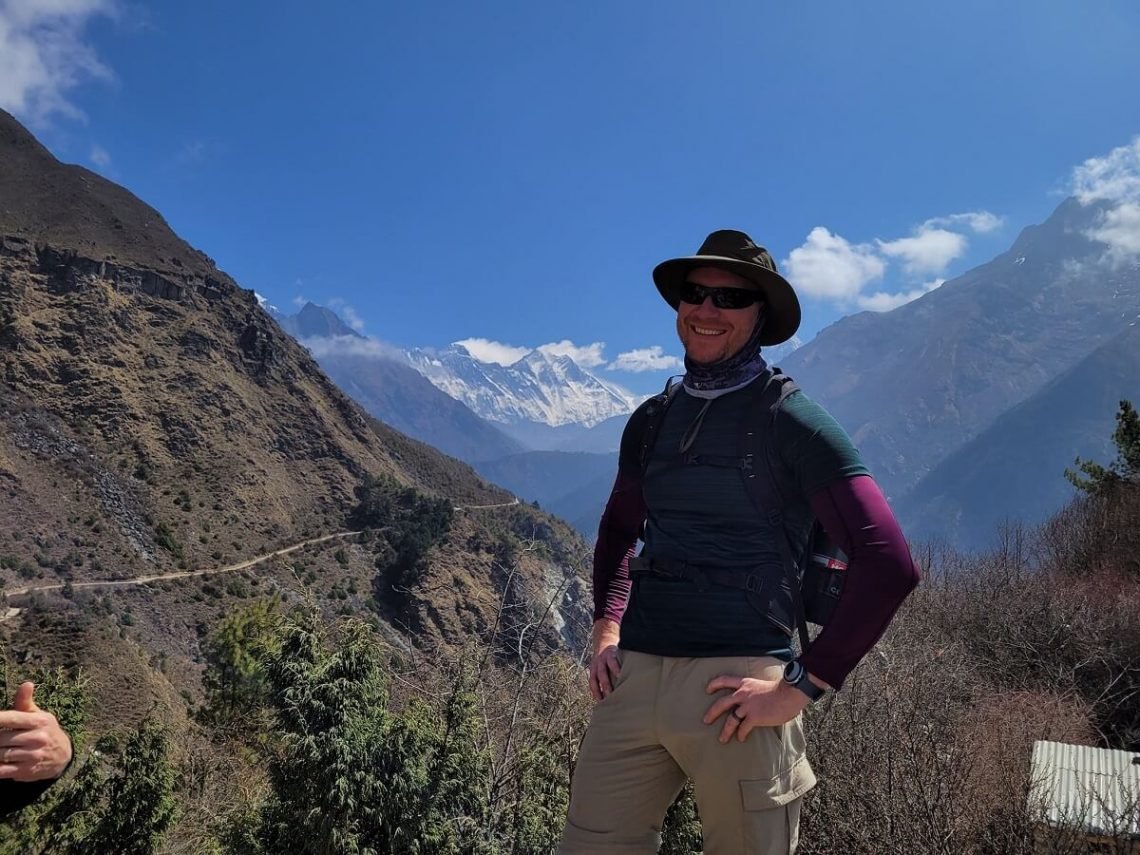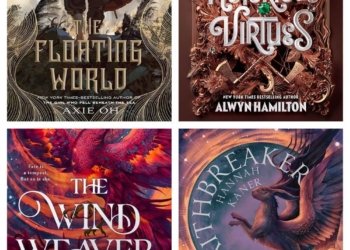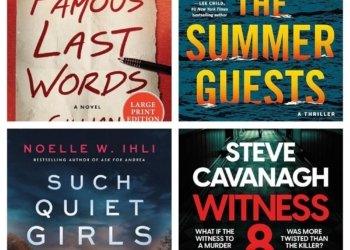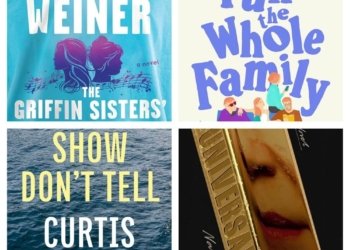No products in the cart.
A Conversation with Tobey Alexander, a YA Fantasy Author
Tobey Alexander is a neurodiverse author, father of three and generally quirky kind of person who enjoys far too much playing in his imagination.
705
SHARES24.6k
VIEWSTobey Alexander, a mad-dad and creative storyteller, has crafted tales that will sweep you off your feet and ignite your imagination. As a father, Tobey knows the power of stories to inspire and uplift his children. Now, he’s sharing his enchanting tales with the world! You’ll find something for everyone, from the thrilling fantasy adventures of Timothy and Cathy Scott to the suspenseful urban thriller Gridlock, and even a fresh take on the afterlife in his paranormal thriller series about Death. But that’s not all! Tobey’s upcoming supernatural superhero series is being considered for production, and he’s working on adapting his books into screenplays, so you might soon see his stories come to life on the big screen!
Born from a desire to help his children escape the challenges they faced, Tobey’s stories are a testament to the healing power of imagination. Join him on this incredible journey and let his tales transport you to new worlds. Tobey’s storytelling and imagination comes from being neurodiverse (autistic), a fact he is proud of and a trait he shares with his children. As an autistic author, it helps in creating genre-blending adventure stories across a variety of subjects. The bottomless pit of Tobey’s imagination means ideas for stories are easy to come by. Be that world-building for thrillers or historical mysteries, character development and inclusive characters are a must in all his stories.
Let’s get started with a quick rapid fire.

Q1. If you could be transformed into one animal, which one would you choose?
A white Tiger! No idea why a normal tiger wouldn’t do, I probably just want to look that little bit cooler!
Q2. Finish the phrase “the way to my heart is…”
Through my bloodstream!?!
Q3. Are you more of an introvert or an extrovert?
Introvert with a well-established mask of extrovert!
Q4. Do you watch shows one episode at a time or binge whole seasons?
Binge, I have no patience for waiting for next week!
Q5. Would you rather travel to the past or to the future?
Past without a doubt, that’s why I enjoy writing there a lot.
Q6. What is your last Google search?
How can I be a more successful author?
Q7. What object do you misplace or lose the most?
My ID card for work, even the kids point to it for me as soon as I say “have you seen my…”
Q8. What is the kindest thing someone ever did for you?
My wife let me go to Everest (Base Camp) with my 13 year old son – just letting us go was gift enough!
Q9. If given the chance to start your life over, would you take it?
No – I’d not want to forget what I’ve got/had so far. Sure I’d change things but not start again. Gabe had always had a skill at disarming people, perhaps it was a thing he had learned at work, but he had always managed to be able to speak to people.Tobey Alexander, Into The Dark
Q10. What is the best present you have ever received?
As soppy as this sounds, my children (mainly because it meant I could have an excuse of not growing up).
Q11. Describe your style in one word.
Quirky!
Q12. If you were to devote the rest of your life to philanthropy, what cause would you choose?
Neurodiversity awareness.
It’s time for a more detailed conversation, Tobey.
You’ve answered our rapid fire brilliantly, Tobey. Now, it’s time for our readers to know more about the person behind the book.
Q. Describe your journey so far.
My journey has been something of a rollercoaster filled with self-doubt and disbelief. I am my own worst saboteur and often talk myself out of releasing or writing things. It’s only in the last few years I feel I’ve found the confidence to release what I want to write. I cannot write to market and instead allow my quirky neurodiverse brain to write whatever subject, genre or theme it’s currently obsessing over. That way I can stay true to myself, but I also know it makes it harder to market myself because I really am all over in genres.
Q. So, what books did you grow up reading?
I grew up reading film adaptations a lot (I remember having one of my autism obsessions about The Lost World and had six different copies that I read dozens of times). I read all of Jack Higgins’ thriller books in my late teens and it was when I read one particular addition to the series, I wasn’t happy with it and challenged myself to write something myself. Growing up I always had a book on the go, reading whenever I could and the more visual, they were the better.
Q. Interesting. Has writing and publishing a book changed the way you see yourself?
Absolutely. I feel more accepting of myself. Having gone through life in a state of constant masking to keep my autistic brain hidden, I feel writing allows me to be true to myself. I find it’s an amazing way of letting other people see the “chaos” of what goes on inside my head as everything I write has been watched, re-watched and visualized to the tiniest of details before a word hits the page. Writing, to me, is as much a form of therapy and self-awareness as it is about sharing things. Having people see what I see is a huge validation that maybe I’m not as weird, awkward or odd as I sometimes allow myself to believe.
The biggest thing it has taught me is to put the niggling self-doubt voice in the back seat and believe in myself more. The world of publishing is fraught with rejections and elements that can seriously test your personal belief and resolve, I’ve learned to haver a thick skin and also find the positive in negatives so I can grow and adapt. I’ve learned I’m better than I ever give myself credit for.


Q. Would you share something about yourself that your readers don’t know (yet)?
I’ve mentioned autism before but I’m proud to wear my neurodiverse badge. I am a late diagnosed (but always known) autistic adult and feel that’s part of what makes writing so compatible with me. That’s boring (and I go on about it a lot to champion acceptance of hidden diversity) so something more interesting is the fact I took my 13 year old son and 59 year old dad to Everest Base Camp in 2022 to raise money for charity, one of those charities related to a chromosome charity because myself and my three children all carry a very rare genetic deletion that makes us, as we say, our own version of the X-Men!
Q. Now comes the most anticipated question that every author must answer. How do you process and deal with negative book reviews?
Really badly! I always sit and spend the first few minutes (maybe hours) wondering if I should de-list the book, whether I should stop writing the new project or else give up forever. Then I mentally slap myself and remind myself of a piece of advice I was given that simply said, “you’re never going to please everybody, see the negatives as a pointer to help you reach more people but remember that for ever one who didn’t like to, there are many more that did.”
I do remember a scathing feedback/review of a screenplay not so long back and my reaction was to stop writing screenplays altogether. I literally didn’t even contemplate it for nine months of that year and vowed never to do it again. Re-reading the feedback there were a lot of points to learn from (despite the tone being absolutely scathing) and I dared to write a new screenplay that year…entering it into a single contest (which I nearly didn’t do) I only went and won! Interestingly that screenplay is for my upcoming book series and has been subject to a formal request from an executive. So from reacting like a petulant child, I rose from the ashes as it were and have a whole new series on the go as a result.
Q. What comes first for you — the plot or the characters — and why?
Plot, without a doubt. I can be sat somewhere (normally in a day-job work meeting) and BOOM an idea hits. I remember a scene I am yet to include that spawned my whole series about the Grim Reaper. I saw it in my head as I was driving home and by the time, I got home I had a whole epic action sequence mapped out. Back then I had no idea who it was and then slowly built the world around it. So very much the plot/scenes come first and then I stare into space to find my character. I literally open the doors and invite my imaginary friends in for an audition until the right one arrives and then we set off on our fantastical journey together navigating the book.
In fact last week my latest character didn’t do as he was told and on a chapter, I planned for one scene, he literally took a detour and made me create a whole extra scene. Annoyingly, he was right, so I just wrote it and did as I was told!
Q. How do you develop your plot and characters?
A lot of it I will come up with at really inopportune moments but my usual practice is to let an idea fester for a day or two…if I remember it then I will note it down and build from there. That way, my head feels like the idea is more than just a passing fancy and it warrants some proper exploration. I always have notebooks (my current one is all funky and fancy covered) where I’ll just jot ideas and thoughts as I go. Sometimes they live and emerge into the story and other times they come to nothing.

Q. What does literary success look like to you?
I’d love to say making my living from my passion, being able to give up the day-job and make a full career out of writing. The greatest success for me would be to sit and watch one of my stories come to life on a big or small screen. With my obsession being films, it’s like the Holy Grail to sit in a cinema and watch a film version of my own book. You’d probably see a very rare occasion where water droplets would come out of my eyes!
Q. Let’s talk about your book. Tell us about it. No major spoilers.
Wow, minefield! I’m currently working on two simultaneous projects which is the fifth in my Coming Of Age Fantasy series (Timothy Scott and Cathy Scott) that is aimed at readers of Harry Potter and Percy Jackson. The series started as a story for my youngest son to give him a hero he could relate to and look up to (that was ultimately base don him) and his story spanned three books. The latter two instalments focus on his younger sister (my daughter being the inspiration) and her exploration of a fantasy world behind an antique mirror.
On the other hand I am writing my twenty-five-year passion project that I remember coming up with when I was fourteen (darn I’ve given my age away now). But it focuses on an alternative genre-mix of a superhero concept called The Raven. This is most certainly a darker story that explores the idea of an undead hero working on behalf of Death to protect us from demons and evil creatures. Having struggled to dare to write the story, it all fell into place last year when I penned the idea as a TV Pilot screenplay. Since then, my keyboard has been on fire and I’m mixing past and present to explore The Raven’s history. I’m a supe proud and excited about where the series is progressing and the first book is almost done. The Raven is going to merge Victorian London with modern London bringing a whole new perspective of the afterlife and also of the infamous Jack The Ripper murders in the 1880s. I’m hoping to do my long-time imaginary friend justice and not fall flat on my face!
Q. What part of the book did you have the hardest time writing?
The hardest part for me was writing the final chapters of the first Timothy Scott books. The story needed to end but also be open for sequels and I remember sitting in the hospital at the time writing. A bit of context might help I suppose. My wife had just gone in for surgery following chemotherapy for breast cancer and my only solace for the hours of waiting was to write the final scenes of Tim’s adventures. I remember worrying about life if I was about to become a single parent and tried to find just the right ending for the story. Because I had been providing support for everyone, I didn’t realise how much I had worn myself down and emotionally I have always struggled. The first draft of those scenes were not what I wanted and when I read them back I realized it was just an expression of all my pent up and hidden fears about what was happening around me. I kept one element (without spoilers) which showed Tim and his dad becoming a lot closer in the end which was the one thing I took forward as I had grown so much closer to all of my children through the process. Needless to say my seven hours in the waiting room (having had the staff forget I was in there) saw me write 6,000 words while not eating, drinking or even moving with music playing in my ears worrying how the day was going to end. When they finally got me and I was taken into the recovery room, a single parent’s life wasn’t my destiny and we emerged from that on a new direction as a family. Sorry, I’m not sure if that answered your question.
Q. If you could meet your characters, what would you say to them?
Sorry for putting you through all of that. In reality I’ve met them (mentally) many times and they’ve forgiven me. Well I think they have, they’re less resentful especially when we reach the end of the books!
Q. What is your writing process like? Are you more of a plotter or a pantser?
I am a huge mix of both. When I get the foundation ideas set in the plotting phase I will then revert to a more “lets see where this takes me” style of writing. When I hit a writer’s block or give enough onto the page, I’ll try and plot again but I really do react to the idea and how it feels is best for the story. I tend to plot more when I’m struggling to find the words to write or at the very early inception of the idea. Otherwise, we go by the seat of our pants!
Q. Let’s talk about the process of writing. When you’re writing an emotional or difficult scene, how do you set the mood?
I literally sit in the chair and go for it. I won’t write a scene unless I am in the right mood and I won’t force myself into a mood for a particular scene otherwise my rebellious little brain risks fighting back and not letting me write. If I know there’s an emotional scene coming, I’ll not write it until my head is ready and then the chair invites me, we get acquainted and tap away until I get told off I’ve been absent for a few minutes/hours/days!
Q. What has helped or hindered you most when writing a book?
Having kids…both helpful and unhelpful at the same time. Distractions when they don’t need to be and inspirations when they do need to be. I wouldn’t swap them for the world but when I’m writing I’ll often get a cute little face pop up behind the screen or a cheeky “do you want a game of Fortnite…” which is actually quite a good indication I’ve got lost in the story a little too long.
Q. It’s been fun. Now, before we wrap this up, do you have any suggestions to help me become a better writer? If so, what are they?
Don’t ever give up! Take feedback for what it is and try and grow from the words you got. Taking the emotion aside, you can always learn from feedback. My autism makes me struggles socially but if it works for you, find people/groups you can talk to. Even as a long-time lurker, I get ideas and feedback even without talking sometimes.
UPDATE:- His book, Cathy Scott: Venit Rings (Mirror Multiverse Fantasy Series Book 5) will be available on Amazon starting June 06, 2023.
Related Posts
A Conversation with Melanie Shawn, a Romance Author
NYT & USA TODAY bestselling author Melanie Shawn lives in Southern California and is a mama to two adult people...
10 Most Anticipated Fantasy Books of Spring 2025
As the seasons change and we step into the vibrant energy of spring 2025, readers everywhere are eagerly anticipating fresh...
10 Most Anticipated Thriller Books of Spring 2025
Are you a bookworm who thrives on heart-pounding suspense and unexpected twists? Get ready to mark your calendars and clear...
8 Most Anticipated Contemporary Books of Spring 2025
Are you a bookworm always on the lookout for the next big literary gem to dive into? Well, get ready...
About Us

Trenzle
Where Trends are made and discovered
Trenzle is your official source of discovering the latest people, work, and ideas that deserve to trend. Discover Authors and their books, Creators and their work, People and their opinions, and Stories from around the globe.
Learn more
Latest Posts
A Conversation with Melanie Shawn, a Romance Author
April 19, 2025
10 Most Anticipated Fantasy Books of Spring 2025
April 18, 2025
Trenzle Top 10 Trending Free Book Deals for April 17, 2025
April 17, 2025
Categories
© 2023 Trenzle - Online Author News & Magazine









